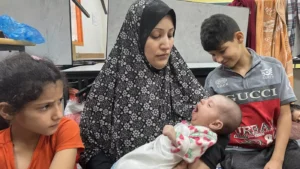The reality of giving birth in a war zone

A woman holds her newborn at an Unwra school in Rafah in the southern Gaza Strip, 10 November 2023
Walaa Sabah reports in Middle East Eye on 17 January 2024:
As the brutal Israeli assault on the Gaza Strip rages on, pregnant Palestinian women are grappling with the challenges of giving birth in a warzone and enduring the post-natal hardships that follow, including lack of medicine, food and water.
According to the World Health Organisation (WHO), there are around 50,000 pregnant women in Gaza and 180 new births per day. Approximately 15 percent of these expectant mothers are predicted to face complications related to pregnancy or childbirth and require additional care.
Such care, which should normally be routine, is now a luxury for many mothers, with Israel blocking aid deliveries into Gaza and hospitals constantly being targeted. Mothers are suffering acute mental distress, trying to keep a baby alive during a war that has killed tens of thousands of people, including more than 10,000 children.
Fedaa Issa is a 28-year-old mother of two who lived in Beit Lahia in the north of Gaza. Before the conflict started, she awaited excitedly the arrival of her new baby girl Aya. “We counted down the days before Aya’s arrival… my daughter Malak was so excited to have a sister to play with. However, the Israeli assault destroyed our dream,” Issa said. “The happiness turned into worry and fear. Pregnancy became a burden on my heart.”
Fedaa fled her home on 14 October after her brother-in-law received a notice from the Israeli army demanding they leave the house. Issa left immediately with her two children Amir and Malak, fearing for the fate of her unborn child. “It was extremely horrific for me to take care of a soul inside my womb while managing my steps.”
Twenty minutes into the escape, Fedaa started bleeding from the exertion. Seeking refuge, she and her family headed to a friend’s house in a neighbouring area, only for missiles to land nearby, forcing them to evacuate southward.
For Palestinians, the ancestral memory of displacement is something they are raised with. The majority of Gaza’s residents are either those expelled by Zionist militias during the Nakba of 1948 or their descendants.
“While escaping, I could not help but remember the tragic stories my beloved grandmother used to share about the Palestinian Nakba,” Issa said. “The forced displacement, moving from one house to another, and the relentless bombardment. It is all happening again. I am witnessing it, and so are my children.”
